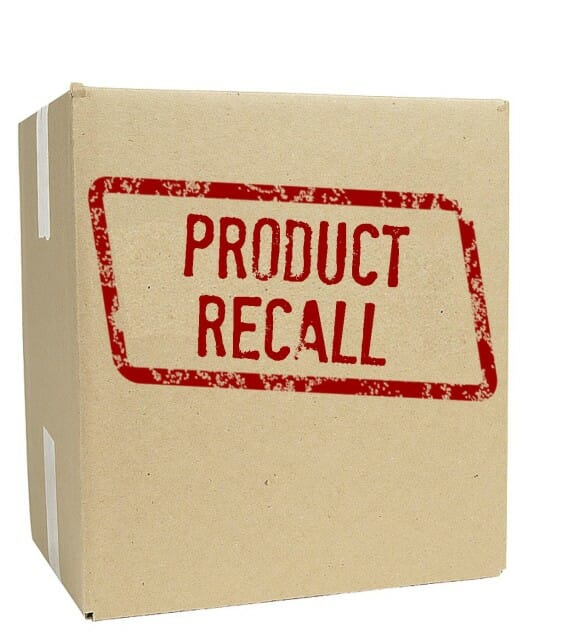We’ve blogged before about products liability and the cannabis industry and we all know it’s just a matter of time before a plaintiff successfully sues a marijuana company for injuries caused by a defective marijuana product. When most businesses hear the term “products liability,” they start to sweat and then to pray that their insurance carrier will cover them against a runaway jury that is quick to punish the offending “corporate” defendant.
But there are a number of things cannabis companies can do to help protect themselves against product liability claims. And one of the best, though usually most expensive mitigation tools is to do a product recall as soon as you learn that one of your products is or may be “bad.” Product recalls help companies protect their customers and, in doing so, help reduce the company’s litigation costs. Just as is done by so many product manufacturers, distributers, and retailers outside the cannabis industry, marijuana businesses should prepare now for any possible recalls, all with an eye towards deciding what should be recalled and how. Though the Food and Drug Administration has its own procedures for product recalls, the marijuana industry has little more than its own best practices and self-made standards to use as its guidelines.
The questions posed below are intended to help you as a cannabis businesses owner or manager think about recall procedures both now and if you ever have sent an unsafe product into the marketplace.
- Do your state’s laws require you to do a recall? The first thing you should determine is whether your state’s marijuana laws or regulations mandate any particular recall procedures for certain events, for instance in the event of customer complaints or negative quality assurance testing. Some states, like Maryland and New York, have such procedures and some states, like Washington and Nevada, do not. Regardless of the state laws on recalls, the makers and sellers of defective products can still be liable.
- Should you issue a recall even if it is not required by state law? If state law does not mandate a recall under certain circumstances, you then must decide whether to institute a recall anyway in an effort to reduce the extent of your liability or even just for public relation purposes. This will depend on a number of factors, including whether the defect affects the safety of your customers, the risk of physical harm to your customers, the involvement of regulatory agencies, and the cost of the recall. Remember, the longer a defective product remains in the marketplace, the greater the risk of it doing harm and triggering product liability lawsuits. There is also a greater likelihood that regulatory agencies will pursue you civilly or even criminally if you don’t get the product off the shelves.
- What will the recall cost you? There are going to be significant costs involved with a product recall, some of which are not strictly monetary. Your obvious first line priority is consumer protection — your customers. Instituting a recall to get products back from them is going to be expensive and most general liability insurance policies do not cover product recalls or their associated costs. Do you know what your policy says on this? Does your insurance policy expressly relieve your insurer of providing you coverage if you are engaging in an illegal activity? Be sure to read your insurance policy and discuss it and the prospect of a product recall with your insurer.
- What about your vendors? Your vendors may also be affected by your recall and they may even be the cause of it. You should be sure to address both products liability and recall issues in your vendor contracts and in your sales contracts. Who between the two of you will be responsible for any resulting harm? Who gets to decide whether or not to initiate a recall? Get all of this clearly set out in writing now, before you have a problem later.
- What about your reputation? Your reputation will suffer if even just a little bit for being associated with a product problem or recall. But when doing a cost benefit analysis, a little hurt pride is usually going to be better than increased consumer complaints, a lawsuit, and/or state or federal agency scrutiny and punishment for unleashing a dangerous product into the marketplace. So, be sure to calculate how your company will handle its customer and industry public relations post-recall.
Above all else, do not wait until you have a recall crisis to establish your recall procedures. Figure out now what might trigger the need for you to recall your products. Figure out now the circumstances that justify the issuance of a recall. Set up now the procedures you will use to implement your recall — how will you put your consumers on notice? What will be your plan for product retrieval? How will you deal with your state regulators and investigators? How will you handle consumer complaints? How will you handle the media? What’s your plan for the resulting PR and reputational repair after the recall? How will you handle the costs associated with potentially having to destroy an entire product line? Perhaps most importantly, now is when you need to figure out who on your team will be doing what and if you do not have the people in-house to handle everything, start lining up the people you need outside of your company to help.
Already in 2015, one Colorado cannabis company has instituted an apparently successful statewide recall of one of its marijuana-infused product and there was a similar recall last summer. Whether you’re a producer, manufacturer, or a retailer, now is the time to establish a reliable and effective recall procedure.
























